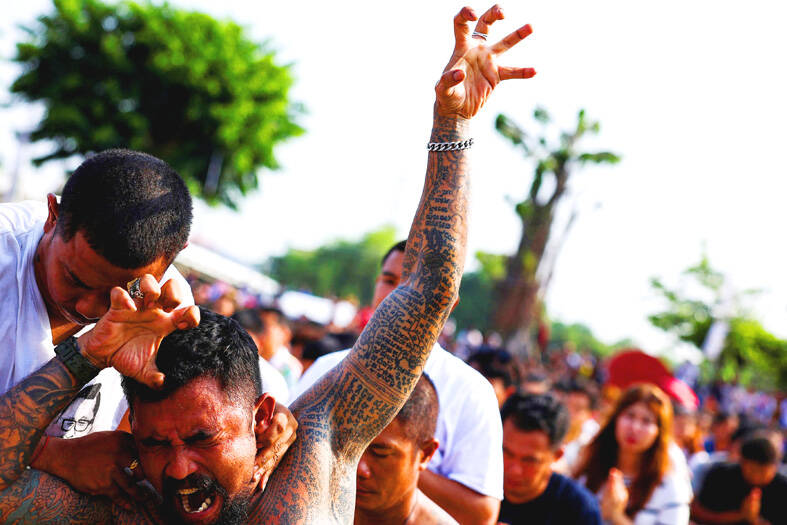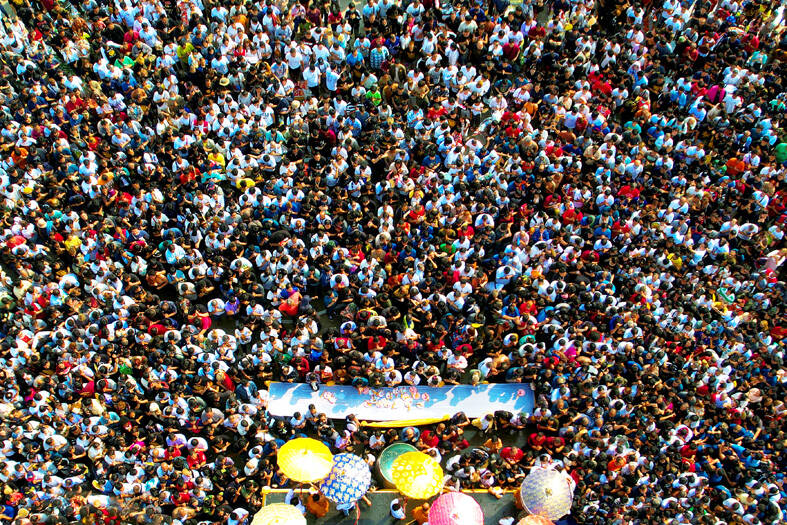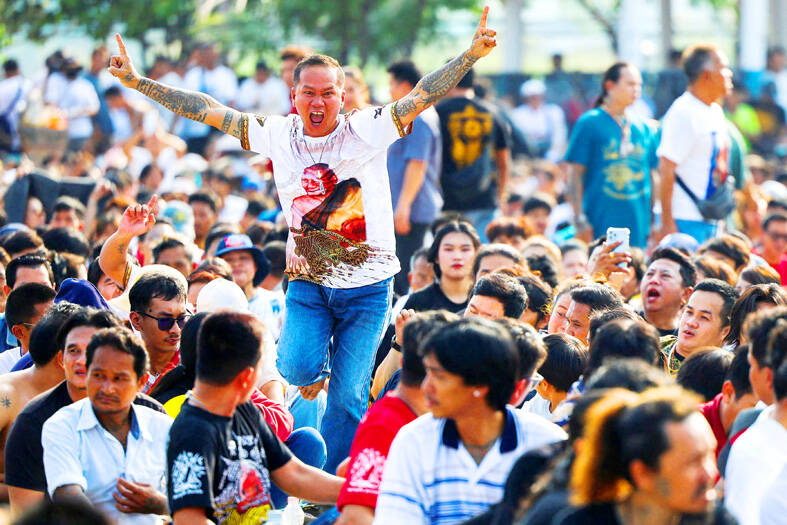Thousands of devotees, some in a state of trance, gathered at a Buddhist temple on the outskirts of Bangkok renowned for sacred tattoos known as Sak Yant, paying their respects to a revered monk who mastered the practice and seeking purification.
The gathering at Wat Bang Phra Buddhist temple is part of a Thai Wai Khru ritual in which devotees pay homage to Luang Phor Pern, the temple’s formal abbot, who died in 2002. He had a reputation for refining and popularizing the temple’s Sak Yant tattoo style.
The idea that tattoos confer magical powers has existed in many parts of Asia for thousands of years. The Sak Yant is a practice also shared by Cambodia and Laos that blends spirituality with superstitions and not specifically related to traditional Buddhist teachings.

Photo: Reuters
The tattoos, which usually include geometric motifs, animal shapes, deities and scripts, are believed to offer protection, bring luck and heal sickness for the wearer.
The tattoos’ magical power were on display during the ceremony where some devotees were in a trance state, or were shouting, running and had to be held back. Some were growling and exhibited behaviors resembling the animals on their tattoos.
Some said they got goose bumps from the ritual in which monks used holy water to bless thousands of devotees.

Photo: Reuters
Petcharat Mothin, 21, said he believed that his tattoo saved his life.
“I was almost shot once, but the bullet didn’t come out,” he said, adding that the incident made him a believer of the tattoo’s magical power.
Many attend the ritual in the hope that it would help recharge the holiness of their tattoos and boost their luck.

Photo: Reuters
Participants were asked to offer the monks 100 baht (US$2.76), flowers, incense and a pack of cigarettes for a new tattoo or an added inscription. Some of the elaborate sacred tattoos from the temple could cost as much as 20,000 baht.
Monk Tuk, one of the temple’s current tattoo masters, said that beyond the aesthetic, the tattoos remind people to be virtuous and adhere to Buddhist five precepts: to refrain from killing, stealing, sexual misconduct, lying and using intoxicants that cloud the mind.

Seven people sustained mostly minor injuries in an airplane fire in South Korea, authorities said yesterday, with local media suggesting the blaze might have been caused by a portable battery stored in the overhead bin. The Air Busan plane, an Airbus A321, was set to fly to Hong Kong from Gimhae International Airport in southeastern Busan, but caught fire in the rear section on Tuesday night, the South Korean Ministry of Land, Infrastructure and Transport said. A total of 169 passengers and seven flight attendants and staff were evacuated down inflatable slides, it said. Authorities initially reported three injuries, but revised the number

A colossal explosion in the sky, unleashing energy hundreds of times greater than the Hiroshima bomb. A blinding flash nearly as bright as the sun. Shockwaves powerful enough to flatten everything for miles. It might sound apocalyptic, but a newly detected asteroid nearly the size of a football field now has a greater than 1 percent chance of colliding with Earth in about eight years. Such an impact has the potential for city-level devastation, depending on where it strikes. Scientists are not panicking yet, but they are watching closely. “At this point, it’s: ‘Let’s pay a lot of attention, let’s

‘BALD-FACED LIE’: The woman is accused of administering non-prescribed drugs to the one-year-old and filmed the toddler’s distress to solicit donations online A social media influencer accused of filming the torture of her baby to gain money allegedly manufactured symptoms causing the toddler to have brain surgery, a magistrate has heard. The 34-year-old Queensland woman is charged with torturing an infant and posting videos of the little girl online to build a social media following and solicit donations. A decision on her bail application in a Brisbane court was yesterday postponed after the magistrate opted to take more time before making a decision in an effort “not to be overwhelmed” by the nature of allegations “so offensive to right-thinking people.” The Sunshine Coast woman —

CHEER ON: Students were greeted by citizens who honked their car horns or offered them food and drinks, while taxi drivers said they would give marchers a lift home Hundreds of students protesting graft they blame for 15 deaths in a building collapse on Friday marched through Serbia to the northern city of Novi Sad, where they plan to block three Danube River bridges this weekend. They received a hero’s welcome from fellow students and thousands of local residents in Novi Said after arriving on foot in their two-day, 80km journey from Belgrade. A small red carpet was placed on one of the bridges across the Danube that the students crossed as they entered the city. The bridge blockade planned for yesterday is to mark three months since a huge concrete construction